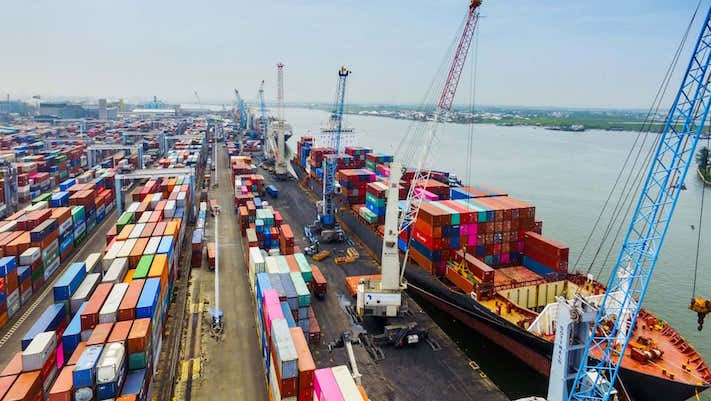Business activities in the nation’s port industry recorded several ups and downs in the cause of the year due to the volatility in the global business environment and the lingering impact of COVID-19 pandemic.
Check by BusinessDay shows that importers and exporters struggled to do business in 2021 as many were setback by issues such as container shortage, high cost of freight, high exchange rate among others.
On the positive side, issues such as the introduction of electronic call-system for trucks was a plus for the port industry as it resulted to drop in the cost of haulage. Here are five things that shaped Nigeria’s port industry in 2021.
Introduction of electronic call-up system
One of the things that decided the way business activities were handled in the nation’s seaports in 2021 was the introduction of the electronic call-up system known as Eto App by the Nigerian Ports Authority (NPA) and its technical partner, the Trucks Transit Parks Ltd (TTP).
Eto App was used in generating electronic call-ups for trucks, and it enabled better control and management of port-bound trucks. This brought in relief for port users, motorists, Apapa residents from the pains of almost a decade of protracted traffic congestion on port roads.
The introduction of the electronic call-up system, which was the first in the history of the Nigerian port business, drastically reduced the man-hour on the port roads as the system came alongside truck transit parks and pre-gate facilities, which enabled trucks to desist from queuing on Apapa roads and bridges.
Crash in haulage cost
Another factor that shaped business activities in Nigerian ports was the drop in the cost of transporting containers from the port terminal to the importers’ warehouses.
Five months into the deployment of the electronic call-up system, the cost of transporting containers from Apapa and Tin-Can Ports to importers’ warehouses in Lagos, started declining and currently, it has dropped by 75 percent on a year-on-year basis, from N1.6 million to N.4 million
In addition, the amount paid to shipping companies by cargo owners as demurrage for the delay in taking delivery of their consignments also reduced due to the removal of the almost two weeks’ delay that come with congestion on port roads.
Container shortage
In 2021, cargo owners found it extremely difficult to get space onboard vessels due to the global container scarcity. This resulted to serious disruption in the global supply chain flow as importers, logistics firms, factories, and retail businesses had to wait for weeks and months in some cases to secure space onboard ships.
Container shortage started with the outbreak of the coronavirus, which compelled many economies to lockdown in 2020, and when economic activities reopened in the second half of 2020, a large number of containers were trapped at ports because factories could not operate for months.
Many Nigerian importers also found it extremely tough to bring in their goods from America, Europe, China, India and other Asian countries.
Read also: E-customs critical to growth of Nigeria’s port industry
“There was a long wait to get containers overseas to freight goods into Nigeria especially at the second half of 2021,” Tony Anakebe, a Lagos-based, clearing and forwarding expert, said.
On his part, Ola Adebayo, Haffar Industrial Company confirmed that the shortage of containers made containerised imports from China take longer time than usual to come into the country.
Soaring cost of freight
Another development that defined business activities at the nation’s seaport was the high cost of freight, which was as a result of the container shortage.
In 2021, the cost of freight skyrocketed as the global shortage of containers resulted to rise in the prices of freight and importers who used to pay $28 per metric ton were made to pay between $38 and $39 per ton to bring goods from the United States to Nigeria.
For containerised goods, moving a 40-foot container from India to Nigeria that used to cost between $3,000 and $4,000 went up as high as about $15,000.
High exchange rate
Another thing that shaped business in the nation’s port industry in 2021 was the volatility, scarcity and high rate of foreign exchange as the value of the naira plummeted. Consequently, companies that depend on imports for their critical input especially local industries struggled to survive.
“Many importers were not able to place an order with their suppliers due to scarcity of foreign exchange, and when available, the rate was also very high. And if there is no foreign exchange, there will be no business in the port industry. This challenge worsened the problem of high freight that importers are facing in the global shipping industry,” Anakebe said.
According to him, the high exchange rate of Nigeria’s currency to US dollar compels importer to use as much as N420 to get one dollar.
This, he said, made it difficult for importers to break even and to recoup the amount invested in their business within the year despite the increasing market prices of goods.
Original post by https://businessday.ng/maritime/article/five-things-that-shaped-nigerias-port-business-in-2021/

